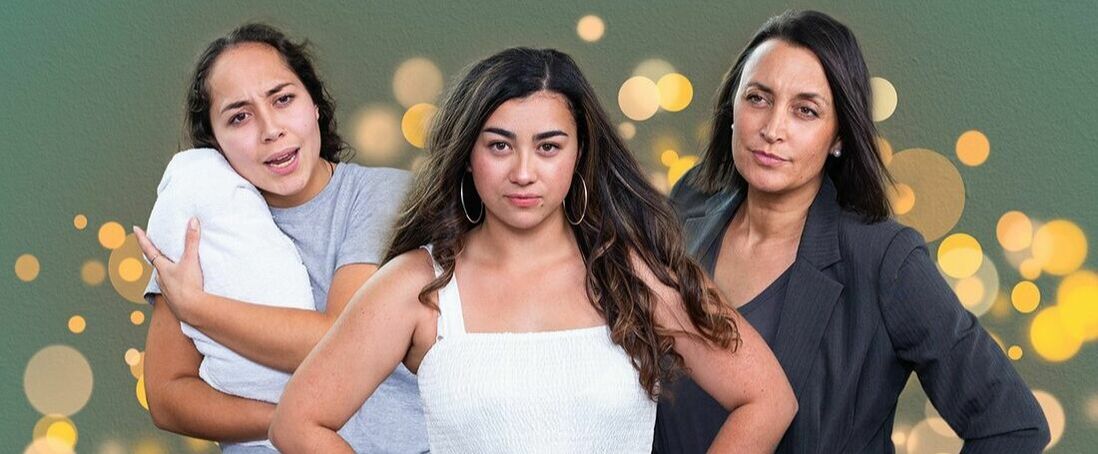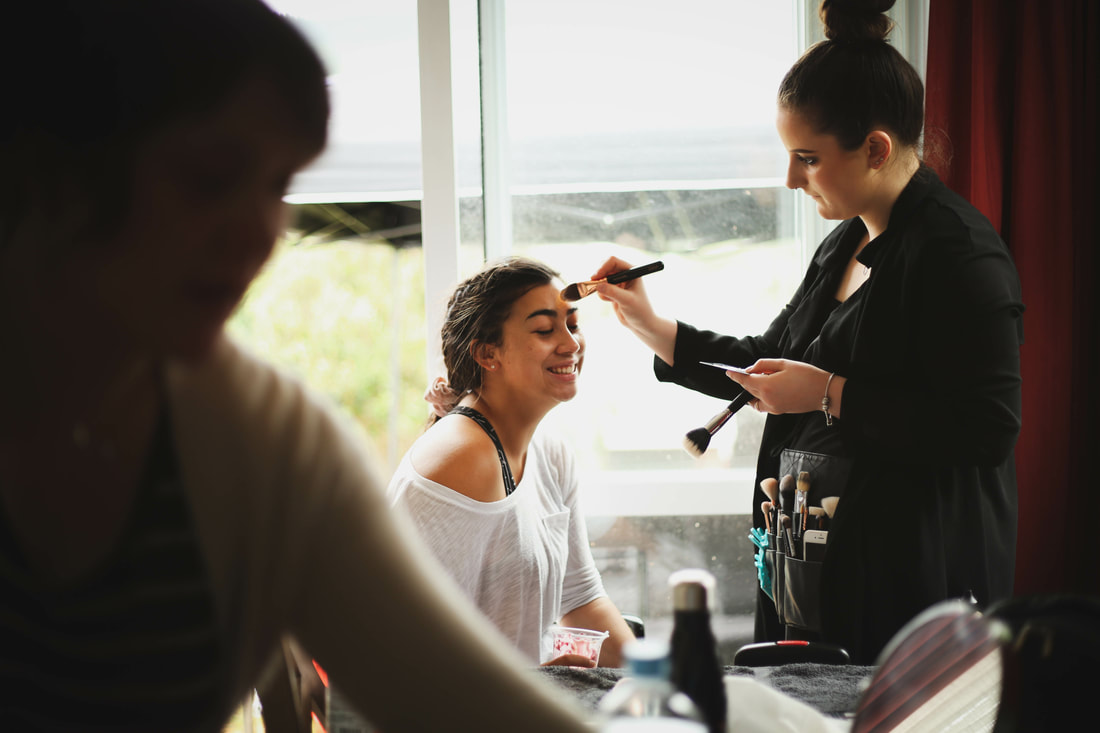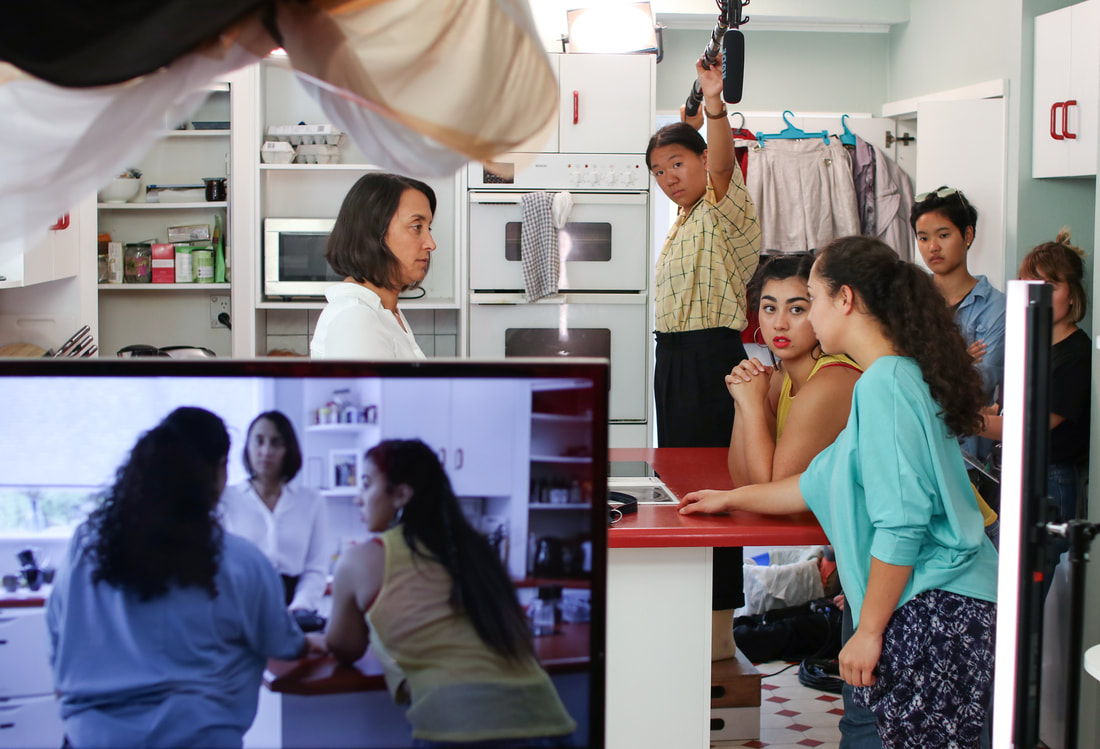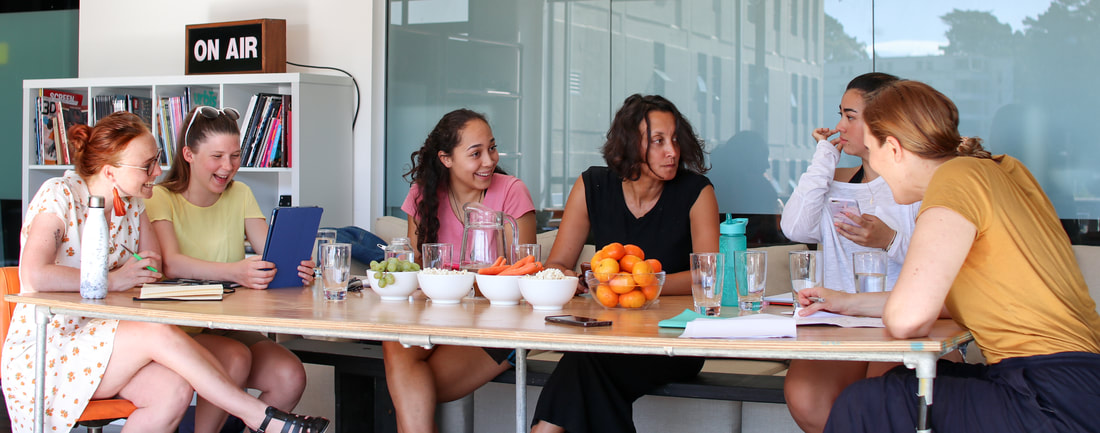Lizzie Murray
Last week I had the privilege of interviewing three Wellington creatives behind the entirely-female produced short film The Girls.
Running late to interviews isn’t ideal, especially when the brownie bar you suggested to meet at is closed. We settle on meeting at the library. The one with books not booze. Between the Mysteries and Graphic Novel sections we lament lack of brownie and discuss the ambitious project. I’m meeting with The Girls’ director Tabitha Arthur, script writer Courtney Rose Brown and producer Bethany Grace Miller. Changing plans on the fly breaks my Capricorn heart but I quickly relax into the part kõrero, part compliment battle and am enthralled to be a tiny fragment of this inspiring project.
Running late to interviews isn’t ideal, especially when the brownie bar you suggested to meet at is closed. We settle on meeting at the library. The one with books not booze. Between the Mysteries and Graphic Novel sections we lament lack of brownie and discuss the ambitious project. I’m meeting with The Girls’ director Tabitha Arthur, script writer Courtney Rose Brown and producer Bethany Grace Miller. Changing plans on the fly breaks my Capricorn heart but I quickly relax into the part kõrero, part compliment battle and am enthralled to be a tiny fragment of this inspiring project.
Brown and Miller’s production company is called Toi Ngākau Productions. The name is derived from a phrase that translates to “in praise of all women.” Ngākau means heart and toi means art. “Toi Ngākau is kind of like saying “art with heart,” laughs Miller. The short film is co-produced by Arthur’s production company LightShade Creatives.
The women excitedly tell me about the film. The Girls is a Kiwi comedy about an awkward coming out story. 18 year old Cool Girl Jewelisa (Marshayla Christie) is confronted by her religious mother (Raquel Roderick). Accused of having sex with boys and becoming another teen-mum statistic, like her young-mum sister (Shania Bailey-Edmonds), Jewelisa finds herself confessing her deepest secret to her family in the most awkward circumstances. The short film focuses on minority-acceptance and complex women's relationships.
Curious, I wanted to know more.
I understand the project started with Courtney’s script. What interested you, Bethany and Tabitha, about Courtney’s project?
Bethany: I think it's really cool how it's not just a progressive story preaching to the non-progressive world. It plays with stereotypes and narratives we’re so used to seeing so it could play with anyone’s assumptions. I thought it was so fun. And powerful. Drawing out people’s assumptions make the watcher aware of them.
Tabitha: I thought the script was really smart in a playful and light way. There’s a wonderful complex messy relationship between the sisters and and the mother and what goes on in that family dynamic.
Comedy has this wonderful ability to get us laughing and open us up. To open our minds and hearts and then go boom! That really helps us challenge what we’re thinking because were not being hit over the head with a hammer, it’s not didactic.
And they fact that it's not about a guy. I liked that it’s an opportunity for a story told through a female lense about messy, very human women. It’s a black kiwi comedy. Funny and women don’t go together in film often enough.
What inspired the script for The Girls?
Courtney: I’d been thinking a lot about skits and how it’s really just one idea for a short scene. It’s not expanded - and that’s kind of like some short films. I was thinking a lot about film tropes like how often there will be a talented but poor girl, and she has an obstacle. Often the obstacle will be her becoming pregnant and which will “ruin her life”. That’s dumb! I was thinking about different forms of contraception and I was like “being gay is pretty good.”
Tabitha: - being gay is a pretty good contraception!
Courtney: I was thinking about sitcoms and how there’s always the popular, ditzy teenage girl who has a “you can’t go out dressed like that, young lady” sort of dynamic with the parents. I wanted to play with the idea of “the cool girl” by switching it on its head. And I’m playing with how Christianity is often seen as well. I wanted to have that influence why she would be hesitant to reveal her secret to her family.
Because you come from a Christian background?
Yes. I like to include it into narratives. With writing I like showing stereotypes and then showing a new branch. The character won’t represent all of Christianity or all of women but just an aspect. That was quite fun. I wrote the first draft on a writing retreat through Playmarket I went on last year in like 10 minutes. I really wanted to play with everyone no matter what feminist lense they are looking at it in. Playing with their assumptions and turn it on its head.
The women excitedly tell me about the film. The Girls is a Kiwi comedy about an awkward coming out story. 18 year old Cool Girl Jewelisa (Marshayla Christie) is confronted by her religious mother (Raquel Roderick). Accused of having sex with boys and becoming another teen-mum statistic, like her young-mum sister (Shania Bailey-Edmonds), Jewelisa finds herself confessing her deepest secret to her family in the most awkward circumstances. The short film focuses on minority-acceptance and complex women's relationships.
Curious, I wanted to know more.
I understand the project started with Courtney’s script. What interested you, Bethany and Tabitha, about Courtney’s project?
Bethany: I think it's really cool how it's not just a progressive story preaching to the non-progressive world. It plays with stereotypes and narratives we’re so used to seeing so it could play with anyone’s assumptions. I thought it was so fun. And powerful. Drawing out people’s assumptions make the watcher aware of them.
Tabitha: I thought the script was really smart in a playful and light way. There’s a wonderful complex messy relationship between the sisters and and the mother and what goes on in that family dynamic.
Comedy has this wonderful ability to get us laughing and open us up. To open our minds and hearts and then go boom! That really helps us challenge what we’re thinking because were not being hit over the head with a hammer, it’s not didactic.
And they fact that it's not about a guy. I liked that it’s an opportunity for a story told through a female lense about messy, very human women. It’s a black kiwi comedy. Funny and women don’t go together in film often enough.
What inspired the script for The Girls?
Courtney: I’d been thinking a lot about skits and how it’s really just one idea for a short scene. It’s not expanded - and that’s kind of like some short films. I was thinking a lot about film tropes like how often there will be a talented but poor girl, and she has an obstacle. Often the obstacle will be her becoming pregnant and which will “ruin her life”. That’s dumb! I was thinking about different forms of contraception and I was like “being gay is pretty good.”
Tabitha: - being gay is a pretty good contraception!
Courtney: I was thinking about sitcoms and how there’s always the popular, ditzy teenage girl who has a “you can’t go out dressed like that, young lady” sort of dynamic with the parents. I wanted to play with the idea of “the cool girl” by switching it on its head. And I’m playing with how Christianity is often seen as well. I wanted to have that influence why she would be hesitant to reveal her secret to her family.
Because you come from a Christian background?
Yes. I like to include it into narratives. With writing I like showing stereotypes and then showing a new branch. The character won’t represent all of Christianity or all of women but just an aspect. That was quite fun. I wrote the first draft on a writing retreat through Playmarket I went on last year in like 10 minutes. I really wanted to play with everyone no matter what feminist lense they are looking at it in. Playing with their assumptions and turn it on its head.
Funny and women don't go together in film often enough
The Girls lead actor Marshayla Christie enjoys the detailed work of hair and make up artist Mia Cutelli. PHOTO: Celeste Fontein
What makes this story stand out from other Kiwi comedies?
Courtney: I wanted write a nice queer romance. Because in nice queer romances they don't touch, its platonic, it's very PG. These stories don't have to be overtly sexual but there’s lovely chemistry here and that’s nice.
Tabitha: And the three main women, the mum and two daughters, are Māori. It's so cool to have these women rocking and leading this film. It’s super important to me because I realise that we are pākehā women leading the project. It was really important in the making of this that these three women had equal voice in the room. It was really cool to hear them on set injecting Te Reo.
What challenges did you face leading up to production?
Courtney: Scheduling. Actually, finding people. There were a lot of roles like sound and lighting that naturally have a dominance by men in film because it’s seen as needing strength like with holding the boom.
How did you find women to fill those roles?
Bethany: The Emerging Women Filmmakers Network on Facebook.
Tabitha: That was started by Lucy Holyoake in Wellington and that was a fantastic place to start. There’s another Facebook group called Crew You Wellington which has a whole lot of experienced people that work in film. It was really exciting to see how many people, both men and women, supporting up and coming emerging talent. We had women working on there that are studying, have worked in film and have never done it before.
It was so cool. Like, theatre lighting designer, Isadora Lao. First day on a film set, she came in as a lighting assistant and she ended up rocking a boom. That was amazing to see her standing so strong, holding that boom up and powering through.
It is definitely tricky to find women in those technical roles that are traditionally given to strong armed men. Basically women haven't been encouraged or expected to be able to do it and the more women found out about our film the more excited they were about it. We ended up with so many offers of help and support and help that we couldn’t actually have everyone on our set. It was absolutely incredible to know there was so much support.
Behind the scenes filming The Girls, actors Raquel Roderick, Marshayla Christie and Shania Bailey-Edmonds work a scene. Boom operator Isadora Lao ensures every word is picked up, while lighting assistant Tina Jeong and 1st camera assistant Taylor Galmiche look on. PHOTO: Emma Tiller
What other challenges did you have?
Tabitha: Oh my gosh, there are so many how long do you have? I worked with Director of Photography Jess Charlton on a short film last year and I really wanted to work with her again. As this wasn’t a film where we had all of the money in the world, to have Jess would be really special. But we only had a short window of time with her. We had two weeks to pull the whole film together.
Tabitha: We did it - Bethany, first time producer - she worked so hard. Probably averaged an hour of sleep at night doing the impossible. Pulling our whole team together. That was full on.
Bethany: When people found out the scheduling dates, we had to re-recruit. Back to square one.
How long should you have had to make this short film?
Tabitha: Two years?
Really?
Tabitha: Definitely several months, at least. Developing it.
Courtney: What we were super time poor in was the whole film side of things.
Tabitha: Planning the shoot stuff, but we certainly had some fantastic script development.
Courtney: Yes, it was from having a theatre background. I think normally film actors don’t really rehearse they are just expected to perform. We had workshops with the actors. They found that really special, rehearsing their characters and dynamics. On the day, Tabitha’s like “when you’re ready,” and there’s none of the pressure with “action!”
Tabitha: Oh, I don't say “action.”
Bethany: I think we were really lucky to have had that rehearsal behind us. Because, we had a grounding for when stressful stuff happened.
Tabitha: There isn't really that much time on film sets and in workshopping they performed such a strong bond. Both of the women playing the sisters don't actually have siblings and they created this really cool sister dynamic.
Courtney: It was so cute.
First day on a film set, she came in as a lighting assistant and she ended up rocking a boom
What challenges did you face on set?
Tabitha: On the film set, the lead actor getting stung by a bee. She said “I don't want to worry anyone but I’ve just been stung by a bee and i’m allergic.” But we also had an expert in allergies on set. So that was really fortunate. Also some technical equipment going down.
Bethany: We had to re-source equipment from at least a couple different departments which was a challenge when it's so last minute.
Tabitha: And the equipment goes down while you’re actually shooting. Fighting against light as well. It was hot too, like a sauna.
Where did you shoot?
Courtney: In Tawa.
Tabitha: One of the rooms that we shot in, the sun was pelting in. That was a huge challenge. We had minimal crew as possible in that particular room, after every take we could fling the door open, get the fan going, that was mega challenging. It was so incredible to see how much grit and determination the women particularly in that room had.
Our whole team was so incredible, eh? The way in which the women came together and supported, collaborated and troubleshooted, it was absolutely amazing.
Tabitha: On the film set, the lead actor getting stung by a bee. She said “I don't want to worry anyone but I’ve just been stung by a bee and i’m allergic.” But we also had an expert in allergies on set. So that was really fortunate. Also some technical equipment going down.
Bethany: We had to re-source equipment from at least a couple different departments which was a challenge when it's so last minute.
Tabitha: And the equipment goes down while you’re actually shooting. Fighting against light as well. It was hot too, like a sauna.
Where did you shoot?
Courtney: In Tawa.
Tabitha: One of the rooms that we shot in, the sun was pelting in. That was a huge challenge. We had minimal crew as possible in that particular room, after every take we could fling the door open, get the fan going, that was mega challenging. It was so incredible to see how much grit and determination the women particularly in that room had.
Our whole team was so incredible, eh? The way in which the women came together and supported, collaborated and troubleshooted, it was absolutely amazing.
Workshop with (L-R) scriptwriter Courtney Rose Brown, producer Bethany Miller, actor Shania Bailey-Edmonds, Raquel Roderick and Marshayla Christie, and director Tabitha Arthur. PHOTO: Emma Tiller
I love to fuck things up. I have this wild streak in me where if someone says I can't do something I think "Oh really? Oh, OK what can't I do exactly?"
Tell me more about what it was like working on an all-female film set.
Bethany: It was lovely. And I heard this from lots of women throughout the day about how wonderful it was to be in a space where people were super considerate, accommodating and polite. No egos at all. It was an incredibly constructive environment in general. Very calm. One of the industry individuals I was working with on the set said the calmness reminded them of a professional shoot. They’re used to independent films being a very stressy environment. Everyone poured their heart, soul and so much strength into the shoot.
Tabitha: Usually on film sets you hear “that’s not my department” whereas i felt on ours there was opportunity there if you wanted to take it to you know learn about other departments.
I love to fuck things up. I have this wild streak in me where if someone says you can’t do this I think “oh really? Oh, ok what can’t i do what exactly?” And so we've got this “traditional” way of working where there’s hierarchy and there’s a bit of fear that if you step out of line and you must call action, and I go “Fuck that shit.” I don't know if you can use that as a quote but that’s how I feel. I’m gonna run this thing from what I know, what what motivates me, and I want to make this with nice people. There are heaps of amazing talented passionate curious driven people, I want to work with those people who also happen to be good humans. The lowest common denominator is don't be an asshole.
Tell me about your crowdfunding campaign. What are the funds going towards?
Bethany: We did have a very small amount from the Emerging Artists Trust to cover most things. The Boosted funding campaign has been awesome because we quickly realised we needed more financial support.
Courtney: Gear is really expense. For example, I had to hire a boom mic and half a day was like $300.
Bethany: The unfortunate thing was we had everything we needed except this one little connector piece so we had to get this entire boom pole and set mic set. Cause they wouldn't let us just have one piece.
Tabitha: All of those things add up. Set, set dressing, props.
Courtney: Food and transport. Because when you aren’t paying people, the minimum you can give is free food and cover the transport costs.
Bethany: Catering/units is one of those givens for film. t's always going to be a massive part of budget.
Courtney: Festival entry fees.
Bethany: Publicity and more due to technical difficulties and emergencies that we had on set.
What is your target?
Tabitha: $3,300. We set the amount for our Boosted campaign before we had all those hiccups on set so we actually need more. We need minimum $6,000 just to cover the shoot.
When/where can we see the film?
Tabitha: We are gunning for submission to the Show me Shorts of the next New Zealand Film Festival and Show Me Shorts 2019.
Bethany: And the Māoriland Film Festival in Otaki for next year.
How else can Wellington and Aotearoa support women in film?
Courtney: Step number one, support our Boosted campaign!
Tabitha: In seriousness, support, watch, be vocal. Be vocal about wanting stories like this. Become audiences when it does come out.
Bethany: Whether it's a festival or a blockbuster, the box office tallies the first few days to decide whether a film is successful.
Liking and sharing over watching a film/snippet is massive. And is also incredibly beneficial in almost a monetary way. Always engage as much as you can on Facebook if you’re comfortable to do so. Obviously face to face is epic.
Courtney: The more people that go out and watch the more likely funders will help that kind of work. If people don't have the funds its about getting the word of mouth or sharing the campaign.
To round up our chat can you all describe the film making process of The Girls in one word?
Courtney: Collaborative.
Bethany: I’m going to say: inspirational.
Tabitha: Damn it! This is really hard. How about, hyphenated: anything-is-possible.
The Girls’ Boosted campaign can be found here or on the Toi Ngākau Facebook Page.









